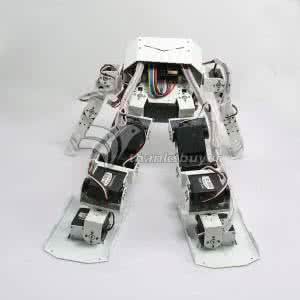We address adversarial attacks on the actuators at the joints of legged robots trained by deep reinforcement learning. The vulnerability to the joint attacks can significantly impact the safety and robustness of legged robots. In this study, we demonstrate that the adversarial perturbations to the torque control signals of the actuators can significantly reduce the rewards and cause walking instability in robots. To find the adversarial torque perturbations, we develop black-box adversarial attacks, where, the adversary cannot access the neural networks trained by deep reinforcement learning. The black box attack can be applied to legged robots regardless of the architecture and algorithms of deep reinforcement learning. We employ three search methods for the black-box adversarial attacks: random search, differential evolution, and numerical gradient descent methods. In experiments with the quadruped robot Ant-v2 and the bipedal robot Humanoid-v2, in OpenAI Gym environments, we find that differential evolution can efficiently find the strongest torque perturbations among the three methods. In addition, we realize that the quadruped robot Ant-v2 is vulnerable to the adversarial perturbations, whereas the bipedal robot Humanoid-v2 is robust to the perturbations. Consequently, the joint attacks can be used for proactive diagnosis of robot walking instability.
翻译:我们解决了在通过深层加固学习训练的腿机器人联合点对导师的对抗性攻击问题。 联合攻击的易感性可以极大地影响腿型机器人的安全和稳健性。 在这项研究中,我们证明对导师的扭压控制信号的对抗性干扰可以大大减少奖励,并造成机器人行走不稳定。 为了找到对冲的扭压扰动, 我们开发了黑箱对抗性攻击, 敌人无法进入通过深层加固学习训练的神经网络。 黑箱攻击可以适用于脚型机器人, 不论深层加固学习的架构和算法如何。 我们使用三种对黑箱对抗性攻击的搜索方法: 随机搜索、 差异进化和数字梯度下降方法。 在四重机器人 Ant- v2 和双重机器人人类2的实验中, 我们发现在 OpenAI Gym 环境里, 差异性进进化的进化进化能找到三种方法中最强的振动感。 此外,我们认识到, 振动的机器人安特- 稳型机器人的进型机器人攻击是易被联的。



